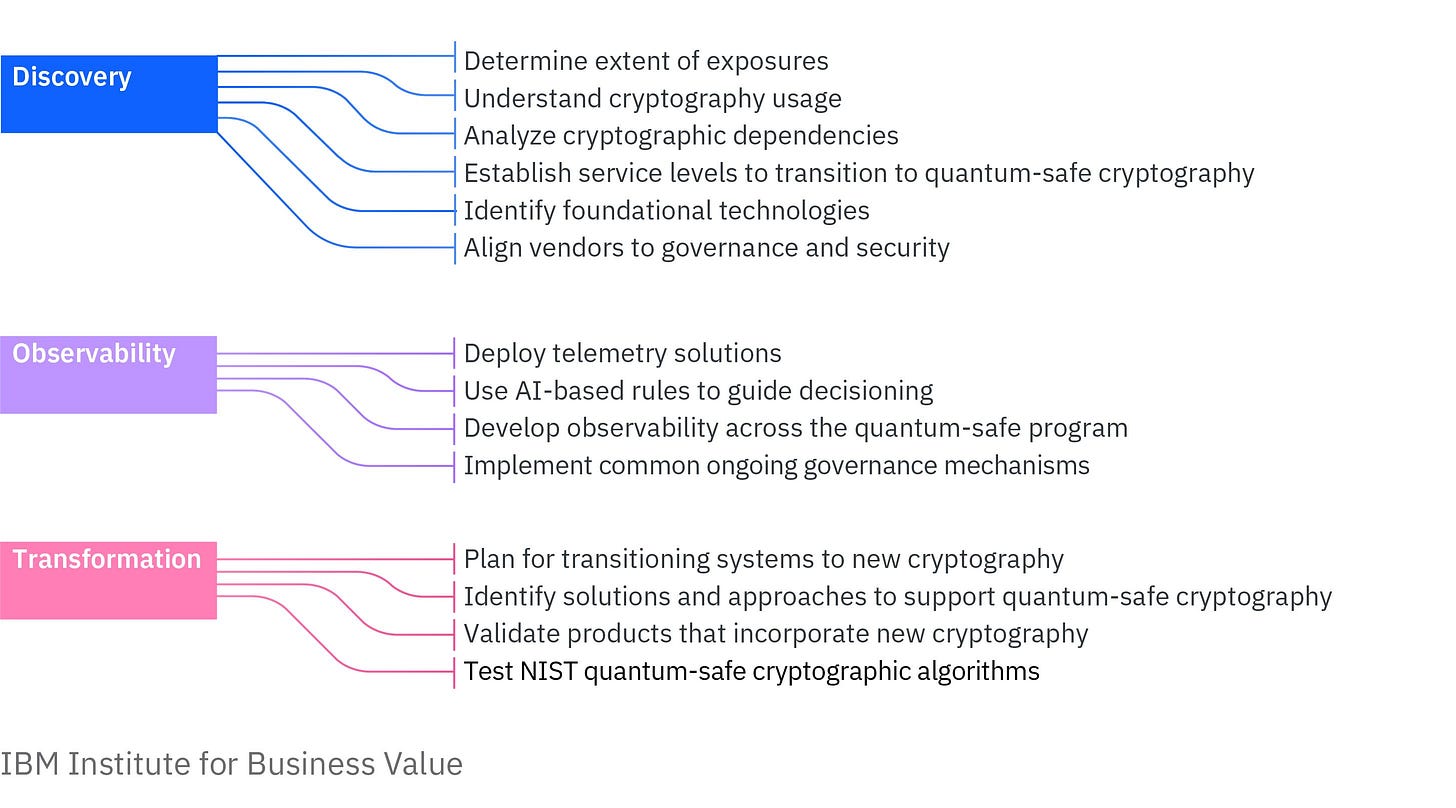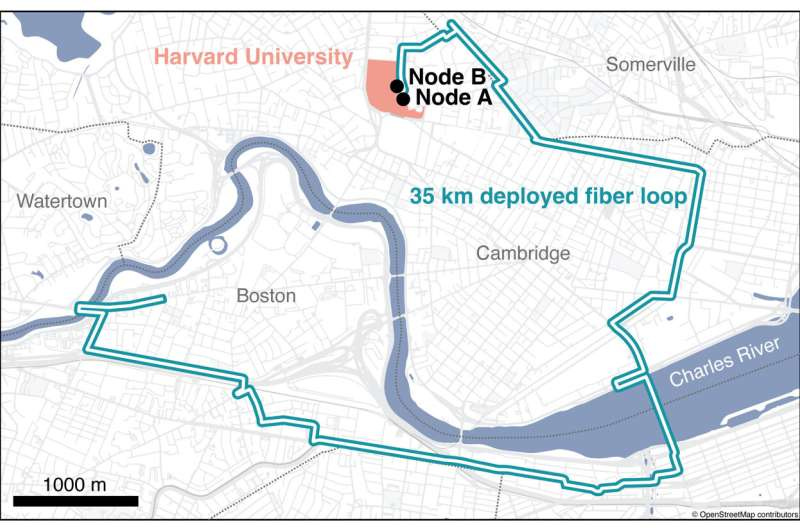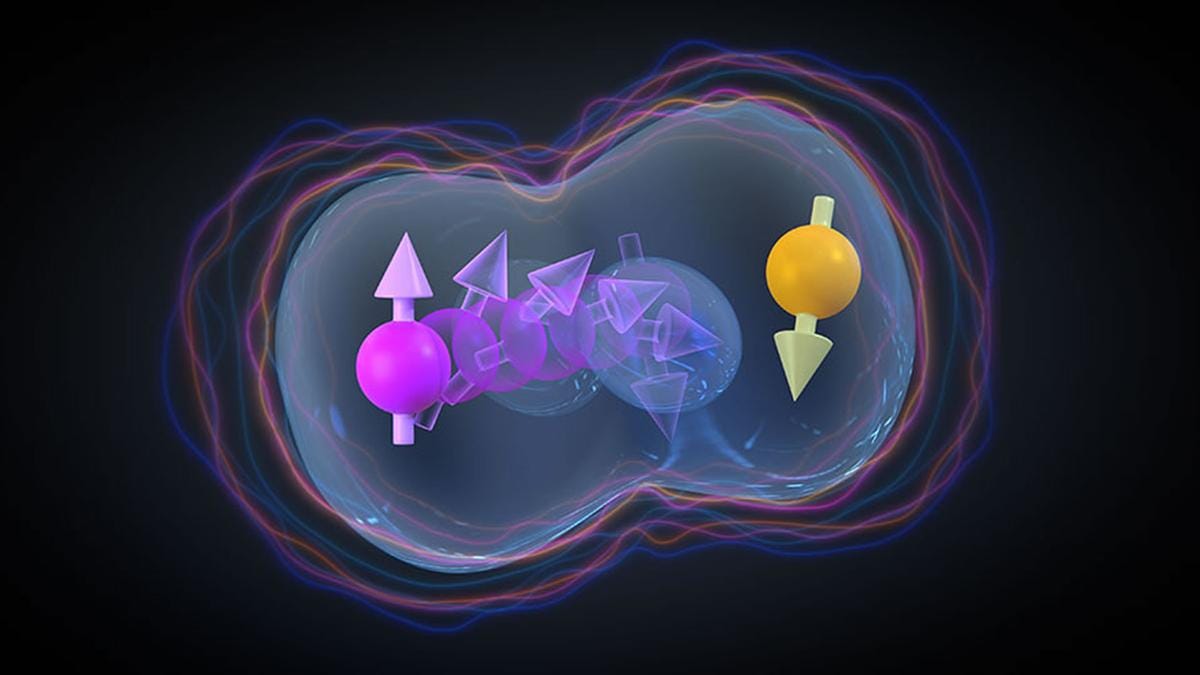The Week in Quantum Computing - May 20th 2024 - IBM, Nvidia, IQM, Alice&Bob and QCentroid
Issue #186
The Week in Quantum Computing. Brought to you by Sergio Gago (@piratecto).
Quick Recap
Quantum advancements continue to pose risks to public-key cryptography (PKC) algorithms, as highlighted by IBM Quantum and UC Berkeley. IBM also re-released Qiskit, after deprecating the Qiskit Quantum Lab. IBM now capitalizes on their effort and the huge community they have created. What is the future of Qiskit is not known, but it could be a good moment to shape up your skills with other frameworks. The Quantum-Safe Readiness Index (QSRI), a joint survey conducted by IBM and Oxford Economics, found global organizations scoring an average of 21 out of 100, indicating a low level of readiness for quantum-safe standards. NVIDIA's open-source NVIDIA CUDA-Q™ platform is set to accelerate quantum computing at supercomputing centers in Germany, Japan, and Poland. IQM Quantum Computers has also announced plans to construct an industrial production unit for quantum computers and chips in France.
The University of Science and Technology of China has developed an artificial quantum system, the Plasmonium qubit, which simulates the fractional anomalous quantum Hall effect at normal temperatures without magnetic fields. LightSolver has developed a desktop-sized optical computer, the LPU100, that rivals the performance of quantum and classical supercomputers. EvolutionQ has launched MultimodalKES, a new cryptographic protocol designed to enhance protection against quantum cyber threats. Alice & Bob, a French quantum computing startup, developed a fault-tolerant Boson cat qubit quantum chip, now available on Google Cloud Marketplace. This chip offers an improved bit-flip time, addressing the issue of qubit decoherence. Q-CTRL is partnering with Hamad Bin Khalifa University’s College of Science and Engineering (CSE) to build Qatar's quantum workforce, while QCentroid and OpenQuantum have announced a strategic partnership to democratize access to quantum computing.
The Week in Quantum Computing
IBM Quantum and UC Berkeley's Advancements in Quantum Computing Threaten Existing Encryption Systems: Global Organizations Score Low in Quantum-Safe Readiness
Quantum computing advancements by IBM Quantum and UC Berkeley are threatening the security of everyday encryption, posing risks to public-key cryptography (PKC) algorithms like RSA and Diffie-Hellman. IBM and Oxford Economics conducted a survey, resulting in the Quantum-Safe Readiness Index (QSRI), which found global organizations have a low level of quantum-safe readiness, scoring an average of 21 out of 100. Sujith Surendranathan, Director of Database Security and Data Protection at Sun Life, emphasizes the need for organizations to balance the adoption of new technologies with the risks they pose. Transitioning to quantum-safe cryptography is essential to maintain digital trust mechanisms.
https://www.ibm.com/thought-leadership/institute-business-value/en-us/report/quantum-safe
NVIDIA Accelerates Quantum Computing Centers Worldwide With CUDA-Q Platform
NVIDIA has announced its open-source NVIDIA CUDA-Q™ platform will accelerate quantum computing at supercomputing centers in Germany, Japan, and Poland. Germany’s Jülich Supercomputing Centre (JSC) will use a Quantum Processing Unit (QPU) from IQM Quantum Computers in its NVIDIA GH200 Grace Hopper™ Superchip-powered JUPITER supercomputer. The ABCI-Q supercomputer at Japan's National Institute of Advanced Industrial Science and Technology (AIST) will incorporate a QPU from QuEra, while Poland’s Poznan Supercomputing and Networking Center (PSNC) has installed two photonic QPUs from ORCA Computing. NVIDIA's Tim Costa stated, "Useful quantum computing will be enabled by the tight integration of quantum with GPU supercomputing."
Choose France Summit with President Macron: IQM Quantum Computers announces plans to build a fabrication facility in France
IQM Quantum Computers, a global leader in building quantum computers, announced plans to construct an industrial production unit for quantum computers and chips in France. The announcement was made during the Choose France summit, attended by global business leaders and hosted by French President Emmanuel Macron. The facility will be Europe's first high-throughput production process for large-scale quantum processors. French Minister of Economy and Finance, Bruno Le Maire, and Secretary General for Investments, Bruno Bonnell, praised the move. IQM's Co-CEO and Co-founder, Dr. Jan Goetz, emphasized France's strong commitment to supporting disruptive innovation. The project's first stage will be developed within CEA-Leti in Grenoble.
https://www.meetiqm.com/newsroom/press-releases/iqm-to-build-a-fabrication-facility-in-france
What Is a Practical Quantum Computer?
Jack Krupansky, a tech writer, explores the concept of a practical quantum computer in his article. He emphasizes that while current quantum computers possess all the necessary functional capabilities, they lack the capacity and quality to support production-scale real-world applications. Krupansky suggests that practical quantum computers should be able to execute a full range of applications, achieve significant quantum advantage over classical computing, and deliver significant business value. He also differentiates between general-purpose quantum computers and special-purpose quantum computing devices. He concludes by stating that achieving practical quantum computing requires improvements in qubit fidelity, connectivity, and the development of a high-level programming model.
https://jackkrupansky.medium.com/what-is-a-practical-quantum-computer-de9c8c1fa4b8
China breakthrough could make fault-tolerant quantum computing a reality
Quantum physicist Pan Jianwei and his team at the University of Science and Technology of China have developed an artificial quantum system, the Plasmonium qubit, which simulates the fractional anomalous quantum Hall effect. This breakthrough allows for the replication of this phenomenon at normal temperatures without magnetic fields. The team also successfully isolated single photons using a Plasmonium array. The development is expected to significantly impact quantum technology and advance fault-tolerant quantum computing, according to Pan.
Video: Professor Javad Shabani on the future of quantum computing
Quantum-inspired' laser computing is more effective than both supercomputing and quantum computing, startup claims
Engineers at startup LightSolver have developed a desktop-sized optical computer, the LPU100, that uses an array of 100 lasers to perform complex artificial intelligence calculations in nanoseconds. This technology reportedly rivals the performance of both quantum and classical supercomputers. The LPU100 uses laser interference to perform computations, achieving a state of minimal energy loss, which corresponds to the problem's solution. The device can perform complex operations such as vector-matrix multiplications in just 10 nanoseconds, hundreds of times quicker than the fastest GPUs. According to Bob Sorensen of Hyperion Research, LightSolver's technology offers "a low barrier to entry for a wide range of advanced computing users."
evolutionQ Unveils MultimodalKES, a New Cryptography Protocol Offering Increased Protection Against Classical and Quantum Cyber Threats
evolutionQ has launched MultimodalKES, a new cryptographic protocol designed to enhance protection against both classical and quantum cyber threats. The protocol is a significant advancement in the field of quantum computing and cybersecurity, offering increased security measures for digital information. The release of MultimodalKES underscores the increasing importance of quantum-safe solutions in the face of growing cyber threats.
Alice & Bob brings fault-tolerant Boson cat qubit quantum chip to Google Cloud Marketplace
French quantum computing startup Alice & Bob has developed a fault-tolerant Boson cat qubit quantum chip, now available on Google Cloud Marketplace. This chip addresses the issue of qubit decoherence, offering a hardware-efficient design that enhances fault tolerance. The Boson 4 chip extends the bit-flip time to seven minutes, a significant improvement over traditional superconducting quantum computers. CEO Théau Peronnin emphasized the company's breakthrough in making cat qubit technology accessible for broader experimentation. The venture capital-backed startup has raised about $33 million from investors such as Elaia Partners SAS and Banque publique d’investissement.
Q-CTRL and HBKU’s College of Science and Engineering Partner to Equip the Next Generation Quantum Workforce in Qatar
Q-CTRL, a global leader in quantum control infrastructure software, is partnering with Hamad Bin Khalifa University’s College of Science and Engineering (CSE) to build Qatar's quantum workforce. The partnership will see the newly established Qatar Center for Quantum Computing (QC2) utilize Q-CTRL’s software to support its educational and research program. The software includes Black Opal, a quantum educational platform, and Fire Opal, a performance-management software designed to enhance the utility of cloud quantum computers.
QCentroid and OpenQuantum Partner to Democratise Access to Quantum Computing Solutions
QCentroid, a Quantum-as-a-Service company, and OpenQuantum, a provider of open-source quantum computing solutions, have announced a strategic partnership to democratise access to quantum computing. The collaboration aims to simplify access, accelerate application development, and reduce costs, thereby overcoming traditional barriers to quantum computing adoption. QCentroid's CEO, Carlos Kuchkovsky, emphasizes the alignment of OpenQuantum's commitment to open-source technology with QCentroid's mission of making quantum solutions accessible to all. Simon Muskett, Co-Founder of OpenQuantum, sees this partnership as an exciting development for the quantum computing industry, enabling more organizations to harness quantum power.
Deutsche Telekom in quantum computing: theme innovation strategy
Deutsche Telekom has developed a quantum computing-based network time validation function, as revealed by six patents filed in Q1 2024. The function uses a quantum search algorithm to efficiently identify anomalies in network time reference signals, ensuring smooth network operation. The company's grant share with quantum computing as a theme stood at 83% in Q1 2024. The patented system leverages quantum computing to validate network time reference signals, identify network clock degradation, and trigger mitigation steps, thereby enhancing network time validation processes and ensuring the reliability of network operations.
https://www.verdict.co.uk/deutsche-telekom-in-quantum-computing-theme-innovation-strategy-2/
Physicists demonstrate first metro-area quantum computer network in Boston
Harvard University physicists, including Mikhail Lukin, Marko Lončar, and Hongkun Park, have demonstrated the world's longest fiber distance between two quantum memory nodes, using existing Boston-area telecommunication fiber. The groundbreaking work, published in Nature, was performed in collaboration with Amazon Web Services and the Harvard Quantum Initiative. The team entangled two quantum memory nodes over a 22-mile loop, establishing the practical makings of the first quantum internet. Each node is a small quantum computer made from a diamond sliver with a silicon-vacancy center defect. This represents a significant step towards practical networking between quantum computers, with plans to extend the network by adding more nodes and experimenting with networking protocols.
https://phys.org/news/2024-05-physicists-metro-area-quantum-network.html
Million qubits chip a possibility, could enable practical quantum computers
Researchers at the University of Basel and The National Center of Competence in Research (NCCR) SPIN have achieved the first controllable two-hole spin qubit interaction on a conventional silicon transistor, opening the door to integrating millions of qubits on a single chip. Today's most advanced quantum computers can only handle a few hundred qubits. The team used a qubit that employs the spin of an electron or a hole’s spin. Dr. Andreas Kuhlmann, team lead, stated that hole spins allow the creation of two-qubit gates that are both fast and high-fidelity.
https://interestingengineering.com/innovation/million-qubit-chips-quantum-computer
PsiQuantum announces QREF and Bartiq: Open-Source Software for Better Tools, Libraries and Datasets
PsiQuantum has announced the availability of the Quantum Resource Estimation Format (QREF) and the beta release of Bartiq, a Quantum Resource Estimator for Fault Tolerant Quantum Computing (FTQC). QREF is an open data format for representing FTQC algorithms, while Bartiq is designed to simplify the complex task of estimating resource requirements for these algorithms. PsiQuantum hopes these tools will catalyze advancements in areas such as cryptography and materials science. The company is committed to fostering open innovation in quantum computing software development and plans to fully launch Bartiq to the open-source community in Q3 2024.
IBM Expands Qiskit, World's Most Performant Quantum Software
IBM has expanded Qiskit, the world's most performant quantum software, refining it into a comprehensive quantum software stack. The focus is on performance and stability to fully harness the power of utility-scale quantum hardware. This enhanced version of Qiskit empowers users to run intricate quantum computing operations with greater efficiency. IBM's move underscores the growing importance and potential of quantum computing in transforming various sectors, from cryptography to complex simulations. With Qiskit's expansion, IBM continues to lead the charge in quantum computing advancements, fostering a more accessible and performant quantum computing environment.
Paper: Quantum computing with Qiskit
The paper details the functionality and future potential of Qiskit, a software development kit for quantum information science. The paper discusses Qiskit's design, software architecture, and core components. It demonstrates Qiskit's capabilities, such as circuit representation and optimization at various abstraction levels, scalability, and retargetability to new gates, through a condensed matter physics problem. The team also explores the ecosystem of tools and plugins that extend Qiskit's use and the future of the software in quantum computing. The research underscores the importance of quantum-classical computations via dynamic circuits in advancing quantum computing.
https://arxiv.org/abs/2405.08810v1
EuroHPC JU and BSC Collaborate on EuroQCS-Spain: A New €8.5M Quantum Computer to Boost European Scientific and Industrial Applications
The European High Performance Computing Joint Undertaking (EuroHPC JU) has initiated a tender for EuroQCS-Spain, a new quantum computer to be integrated into the EuroHPC supercomputer MareNostrum5. Hosted by the Barcelona Supercomputing Center (BSC), the €8.5 million system will be an adiabatic quantum computer, supplementing the digital quantum computer already hosted by BSC under the Quantum Spain initiative. The EuroQCS-Spain consortium, led by BSC, will co-fund the system with EuroHPC JU. The quantum computer will be available to a wide range of European users, supporting the development of applications with industrial, scientific, and societal relevance for Europe. The tender application deadline is 25 June 2024.
https://www.hpcwire.com/off-the-wire/eurohpc-ju-announces-call-for-new-quantum-computer-in-spain/
China achieves localization of core high-density connectivity module for quantum computing
China has achieved domestic production of a core high-density microwave connectivity module for its self-developed quantum computer, "Origin Wukong", ending dependency on foreign suppliers. This module, vital for data transmission in extremely low temperatures, was previously monopolized by Japan. The new module allows stable signal transmission for over 100 quantum chips, enhancing computing capability. The "Origin Wukong" quantum computer, equipped with this module, has completed over 183,000 quantum computing tasks from 120 countries. The achievement marks China's first automated batch testing of quantum chips, reinforcing its leadership in global quantum computing R&D and establishing a self-sufficient industry chain for superconducting quantum computing.
https://www.ecns.cn/m/news/sci-tech/2024-05-16/detail-iheamvqc7126567.shtml
Pasqal & Thales Tackles Satellite Planning Challenges
Quantum computing leader Pasqal, in collaboration with Thales, has successfully used neutral atom quantum computing to solve satellite planning challenges within the AQUAPS project. The three-year venture, supported by the Île-de-France region and GENCI, optimized planning and scheduling processes using Pasqal's quantum processor. The team managed to solve a satellite planning problem on the Quantum Processing Unit (QPU), indicating the suitability of neutral atom quantum computers for such tasks.
https://www.pasqal.com/news/pasqal-and-thales-tackle-satellite-planning-challenges/
"Quantum-HPC Integration and Standardized Benchmarks: Key Discussions at ISC 2024 Conference Panel"
At the ISC 2024 conference, a panel discussion titled "Quantum Advantage — Where are We and What is Needed?" featured experts including Thomas Lippert from Jülich Supercomputing Centre, Laura Schulz from Leibniz Supercomputing Centre, Stefano Mensa from STFC Hartree Centre, and Sabrina Maniscalco, CEO of Algorithmiq Ltd. The panelists discussed quantum-HPC integration, the need for benchmarks, and the role of hybrid quantum-HPC applications. Schulz highlighted Europe's efforts to integrate quantum computers into its advanced HPC centers, aiming to enhance user experience and connect all EuroHPC JU systems for academia and industry use. Mensa stressed the need for standardized quantum benchmarks, citing the SPEC Consortium for HPC as a potential model.
China announces domestic quantum computer component days after US sanctions
Chinese quantum computing research company, Origin Quantum, has developed a crucial 'high-density microwave interconnect module' domestically, just days after the US imposed sanctions aimed at curbing China's quantum technology. The module, likened to the 'neural network' of a quantum computer, was previously reliant on an imported part from Japan. Origin Quantum's researcher, Kong Weicheng, stated that the module could provide stable signal transmission for quantum chips in ultra-low temperatures. The company's success in creating this module enhances the computational capabilities of quantum chips, thereby improving the efficiency of quantum computers. This development signifies a significant stride towards China's self-reliance in quantum technology.





